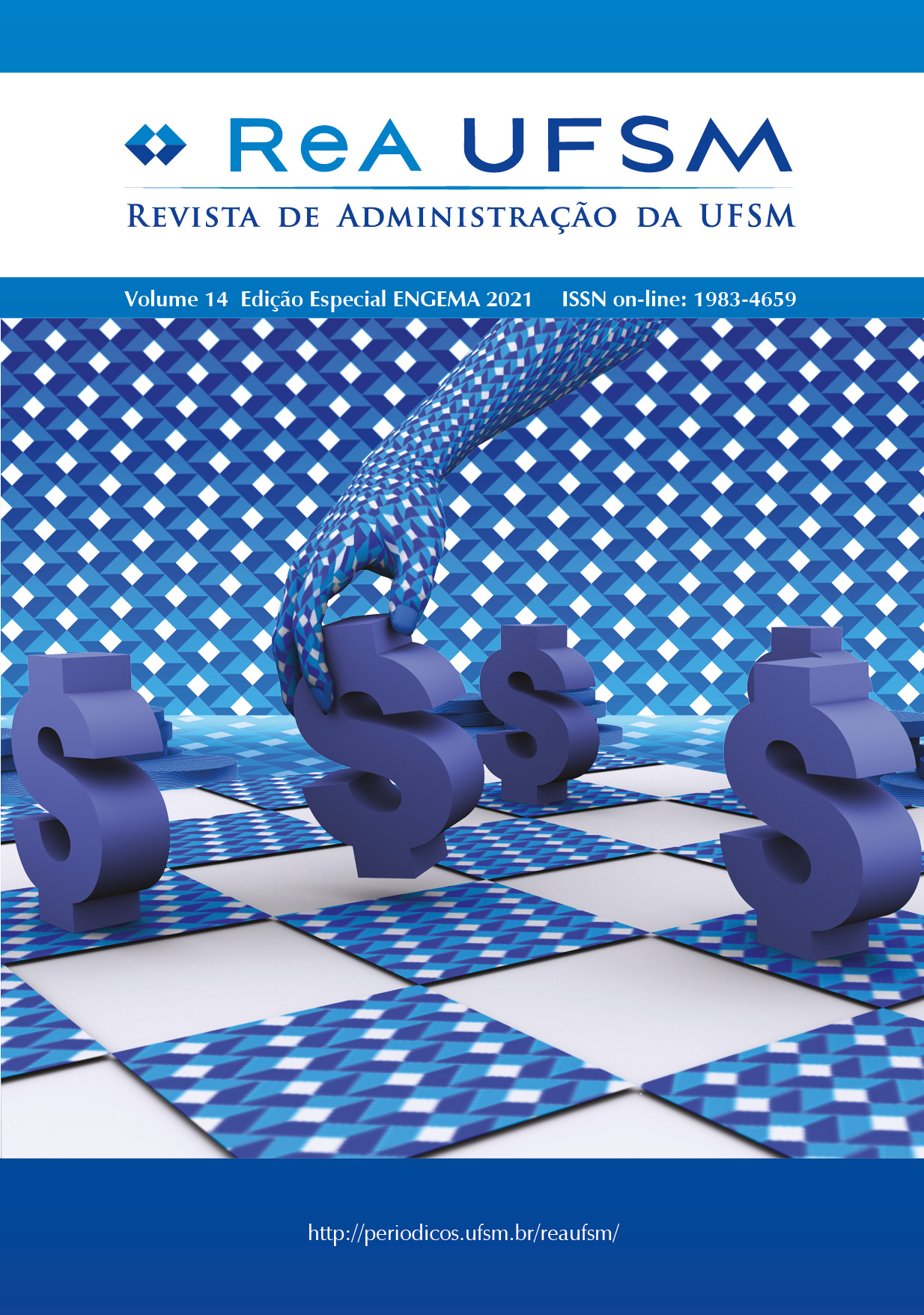The institutional voids, sanitation and water deficits and the first covid-19 numbers in Brazil
DOI:
https://doi.org/10.5902/1983465964800Parole chiave:
Institutional Voids, Sanitation and water, Covid-19.Abstract
Purpose: The problem of this research was: What correlation between the deficit of basic sanitation and treated water in Brazil with the incidence and number of deaths caused by covid-19 disease? The aim of this article was to analyze the correlation between the number of cases in COVID-19 with the statistics of basic sanitation and treated water supply and institutional voids. Methodology: The research is descriptive and uses techniques of correlation statistical analysis of secondary data. Findings: Statistical calculations show a strong correlation of the variables. The incidence of the disease caused by the new Coronavirus SARS-CoV2, COVID-19 is associated with a lower percentage of the population served by sewage network and water network. It was also demonstrated that the mortality of the disease is strongly associated with a lower percentage of the population served by sewage and water networks, thus indicating a relationship with the theory of Institutional Voids (North, 1990; Douglass & North, 1991; Khanna, Palepu, & Sinha, 2005; Khanna & Palepu, 2010; Rodrigues, 2013). Originality: It was observed that, in general, the highest number of deaths due to the disease related to the states of the federation/macro-regions with the lowest percentages of care to the aforementioned networks, with some exceptions. Soon it was possible to use the theory of Institutional Voids in the analysis of Brazil in the face of basic sanitation indicators, thus indicating the absence of a social public policy appropriate to the well-being of the population.
Downloads
Riferimenti bibliografici
Cohen, A. (2003). Multiple commitments in the workplace: an integrative approach. London: Psychology Press.
Elflein, J. (2020). Coronavirus (COVID-19) disease pandemic: statistics & facts. Retrived 26 june 2020 from https://www.statista.com/topics/5994/the-coronavirus-disease-covid-19-outbreak/.
Harrison, R., Scheela, W., Lai, P. C., & Vivekarajah, S. (2018). Beyond institutional voids and the middle-income trap: the emerging business angel market in Malaysia. Asia Pacific Journal of Management, 35(4), 965-991. https://www.doi.org710.1007/s10490-017-9535-y.
HealthData (2021). COVID-19 Projections. https://covid19.healthdata.org/global?view= cumulative-deaths&tab=trend.
Khanna, T., & Palepu, K. (1997). Why focused strategies may be wrong for emerging markets. Harvard Business Review, 75(4), 41-54.
Khanna, T., & Palepu, K. G. (2010). The nature of institutional voids in emerging markets. In T. Khanna; & K. G. Palepu Winning in emerging markets: a road map for strategy and execution. Boston: Harvard Business Review.
Khanna, T., Palepu, K. G., & Sinha, J. (2005). Strategies that fit emerging markets. Harvard Business Review, 83(6), 4-19.
Kinahan, T. J., Churchill, B. M., McLorie, G. A., Gilmour, R.F., & Khoury, A. E. (1992). The efficiency of bladder emptying in the prune belly syndrome. The Journal of Urology, 148(2), 600-603. https://doi.org/10.1016/S0022-5347(17)36665-X.
Mair, J., & Marti, I. (2009). Entrepreneurship in and around institutional voids: a case study from Bangladesh. Journal of Business Venturing, 24(5), 419-435. https://doi.org/10.1016/ j.jbusvent.2008.04.006.
Mair, J., Marti, I., & Ventresca, M. J. (2012). Building inclusive markets in rural Bangladesh: How intermediaries work institutional voids. Academy of Management Journal, 55(4), 819-850. https://doi.org/10.5465/amj.2010.0627.
McCarthy, D. J., & Puffer, S. M. (2016). Institutional voids in an emerging economy: From problem to opportunity. Journal of Leadership & Organizational Studies, 23(2), 208-219. https://doi.org/10.1177/1548051816633070.
Mingo, S. (2013). Entrepreneurial ventures, institutional voids, and business group affiliation: the case of two Brazilian start-ups, 2002-2009. Academia Revista Latinoamericana de Administración, 26(1), 61-76. https://doi.org/10.1108/ARLA-05-2013-0040.
Ministério da Saúde (2021). Painel coronavírus no Brasil. Recuperado em 13 de setembro de 2021, de https://covid.saude.gov.br/.
Ministério do Desenvolvimento Regional (2020). Sistema Nacional de Informações sobre Saneamento – SNIS. Recuperado em 26 de junho de 2020, de http://www.snis.gov.br/.
North, D. C. (1991). Institutions. Journal of Economic Perspectives, 5(1), 97-112. https://doi.org/10.1257/jep.5.1.97.
Petry, P. C. (2020). Epidemiologia em tempos da pandemia Covid-19. Saberes Plurais: Educação na Saúde, 4(1), 6-10.
Rigueira Jr., I. (2020). Grupo da UFMG vai monitorar o novo coronavírus no esgoto em BH e Contagem. Recuperado em 05 de julho de 2020, de https://ufmg.br/comunicacao/noticias/ grupo-da-ufmg-executa-projeto-piloto-de-monitoramento-da-covid-19-no-esgoto.
Rodrigues, S. B. (2013). Understanding the environments of emerging markets: the social costs of institutional voids. Rotterdam: Erasmus Research Institute of Management. Recuperado em 21 de junho de 2020, de https://repub.eur.nl/pub/40429/40429.pdf.
Scott, W. R. (2008). Approaching adulthood: the maturing of institutional theory. Theory and Society, 37(5), 427-442. https://doi.org/10.1007/s11186-008-9067-z.
Webb, J. W., Khoury, T. A., & Hitt, M. A. (2020). The influence of formal and informal institutional voids on entrepreneurship. Entrepreneurship Theory and Practice, 44(3), 504-526. https://doi.org/10.1177/1042258719830310.
World Health Organization. (2020). COVID-19 strategy update. Recuperado em 21 de junho de 2020, de https://www.who.int/publications/i/item/covid-19-strategy-update---14-april-2020.
Zucker, L. G. (1987). Institutional theories of organization. Annual Review of Sociology, 13(1), 443-464. https://doi.org/10.1146/annurev.so.13.080187.002303.
##submission.downloads##
Pubblicato
Come citare
Fascicolo
Sezione
Licenza
Copyright (c) 2021 Revista de Administração da UFSM

TQuesto lavoro è fornito con la licenza Creative Commons Attribuzione 4.0 Internazionale.
Authors of articles published by ReA/UFSM retain the copyright of their works, licensing them under the Creative Commons (CC-BY 4.0), which allows articles to be reused and distributed without restriction, provided that the original work is properly cited.






